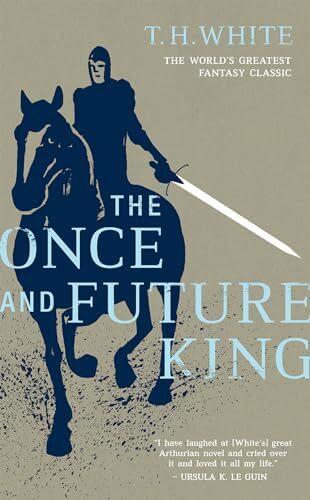
This is a collection of 5 books smooshed together that retell the story of King Arthur. Although the overall story arc is interesting, and some of the books are better than others, the overall combination was very hit-and-miss. The style is meant to be humorous and mocking, but I found very little of it to actually be funny; worse yet, the silliness of the book took away from the parts that were supposed to be serious, gallant, or dramatic (e.g., the battle scenes, the ethical dilemmas, etc.); finally, there are long stretches dedicated to discussing political philosophy, and plenty of allegories to modern history (especially World War II), but they felt decidedly out of place and ineffective in the context of the Middle Ages.
The five books are:
-
The Sword in the Stone: the story of the young King Arthur, who goes by the name Wart, his education by Merlin, an adventure with Robin Hood, and finally, Arthur pulling Excalibur out the stone. This book feels like a kids story, full of talking animals, ridiculous magic (Merlin turns himself and Wart into animals at will), slapstick, and cartoony characters (King Pellinore, the giant, the witch, etc.).
-
The Witch in the Wood: the story of a young King Arthur assembling the round table (and lots of simplistic discussions of the morals of “might makes right”), the battle with King Lot, and the introduction of the Orkney faction (who take the story in a dark and disturbing direction, especially in contrast to the childish first book).
-
The Ill-Made Knight: the (tragic) story of Sir Lancelot, his love for Guinevere, the quests he takes on to try to distract himself from her, how he is tricked into rescuing and sleeping with Elaine (she is even more tragic than Lancelot), his son Galahad, and the quest for the holy grail. This is probably the strongest and most interesting book in the series.
-
The Candle in the Wind: the story of Mordred, King Arthur’s illegitimate son (by his half-sister!), and his attempt to bring down Arthur and Camelot by publicly accusing Lancelot of having an affair with Guinevere, attempting to catch them in the act in Guinevere’s bedroom, starting wars, and so on. The story is a bit uneven, exciting at parts, frustrating in other parts, but it has a touching ending with Arthur passing on his message of peace (which is like a “candle in the wind” that can only be kept alight with great effort) to his page, who turns out to be Tom of Warwick (i.e., Thomas Malory, author of Le Morte d’Arthur, the original tale of King Arthur).
-
The Book of Merlyn: the story of Arthur, hours before his final battle with Mordred, being pulled away by Merlin into some magical realm to discuss morality and politics with all the animals he encountered in the first book. This book was published posthumously, and feels entirely out of place. The majority of it is a long sermon on how horrible man is compared to all other animals, the evils of all modern political systems (communism, fascism, capitalism), and how, apparently, anarchy is the real solution. I had no desire to read a political rant and the book would’ve been far better off sticking with the touching ending from book 4.
Overall, while there are some good parts, given the length of this series, I struggle to recommend it as a whole.
